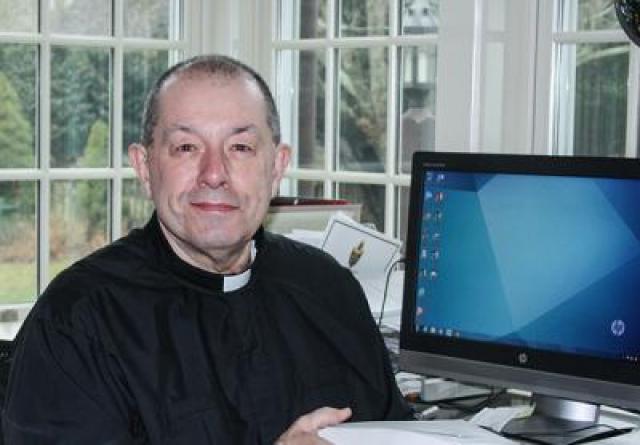‘No One Is Illegal,’ Minister Tells Village

Jesus’s Sermon on the Mount was “not pious platitudes but a call for action among his followers to respect those who are persecuted,” the Rev. Denis Brunelle of St. Luke’s Episcopal Church said last Thursday at an East Hampton Village Board meeting. “Or don’t forget the final judgment in Matthew: When I was hungry did you feed me? When I was naked did you clothe me? When I was homeless did you give me a place to stay? When I was a stranger did you welcome me? And when you did, you did it to me.”These, he said, are religious values that the East Hampton Clericus, which he heads, is bringing to the immigration issue.Secular matters were briefly sidelined when Mr. Brunelle delivered an impassioned and defiant statement against the federal government’s intention to deport millions of undocumented immigrants.Mr. Brunelle thanked Mayor Paul F. Rickenbach Jr. for his Feb. 24 statement in which he declared that the village government would not allow or authorize its personnel to become federal deputies in order to carry out immigration enforcement activities. His further remarks were akin to a sermon, however, encompassing religious teachings from multiple faiths, local and national history, and allegations of exploitation of laborers in an emphatic refutation of federal immigration policy as conducted by the administration of President Donald Trump.“The policy is the policy,” said Mr. Brunelle, a first-generation American of French-Canadian descent. “But we as clergy have to deal with the people involved.”He reminded the assembled that the Puritans came to the New World from England to escape religious intolerance. “Then other religions came over and the Puritans didn’t allow them to practice their faith,” he said. That intolerance returned during the wave of migration from Europe in the late-19th and early-20th centuries, he said, citing discrimination against Irish, Italian, and German immigrants. “Intolerance, unfortunately, has been a consequence of the history of this country in many ways,” he said.That intolerance played out in East Hampton, as well, Mr. Brunelle said. “This village did not allow another religion to have another church until 1848,” he said. “From 1648 there was only one church allowed, the Presbyterian church — no offense against Presbyterians. It wasn’t until 12 Episcopalians got a little ticked off at always having to go seven miles up the road to Sag Harbor, and they said, ‘Enough of this,’ ” that they obtained the property on which St. Luke’s was built.The Clericus, he said, seeks to bring people together and end intolerance. He confessed an aversion to the word tolerance, however, “because tolerance means I don’t have to respect you, tolerance says I don’t have to like you in any shape or form. I just will be in your presence. . . . I think it’s about respect, and dignity.”Mr. Brunelle recalled how Rabbi Sheldon Zimmerman of the Jewish Center of the Hamptons, another member of the Clericus, had reminded him and other clergy that it is “a blessing . . . to permit others to live among us in peace and security.” Rabbi Zimmerman, he said, had pointed to a teaching from the Torah: “When strangers reside with you in your land, you shall not wrong them. The strangers who reside with you shall be to you as your citizens; you shall love each one as yourself, for you were strangers in the land of Egypt.”“The premise of the Clericus as we approach the issue is one of respecting the integrity and the dignity of every human being that is in this village and in this town.” Parents should not be taken away in the middle of the night, leaving children behind, “and it has happened,” he said. “We want to respect the dignity and integrity of every human being when we know that there are contractors who go past the railroad station and hire people but don’t give them an opportunity to get lunch.”The Clericus established a bagged-lunch program in which meals are distributed to the laborers who gather at the Long Island Rail Road station in East Hampton on Thursdays, Fridays, and Saturdays. However, Mr. Brunelle said on Tuesday, “we’re seeing a dramatic decrease in numbers” at the train station, as undocumented immigrants are too afraid to appear in public lest they be detained and perhaps deported by immigration authorities.At the work session, Mr. Brunelle cited a report he said was given to Cantor Debra Stein of the Jewish Center of the Hamptons alleging that a contractor had refused to pay three documented laborers for three days of work.The Clericus, through the Rev. Gerardo Roma Garcia, who leads a Latino ministry at St. Luke’s, has also implemented a program in which clothing is laundered free of charge on the first Sunday of each month. The program is not just for Latinos, Mr. Brunelle said, but also for “anyone trying to balance between the cost of laundry and food or medicine.”The Clericus is also “trying to seek a way to provide legal help whenever we can,” and its members have discussed houses of worship that could serve as sanctuaries, although “that in itself does not protect” undocumented immigrants from detention or deportation, he said on Tuesday. Immigration agents, he said, “can still walk into a church and arrest people. They don’t because of the publicity it would render them.”“We are working together to help address it from our spiritual point of view, from the Gospel mandate point of view, from the Torah point of view,” Mr. Brunelle told the board, “that no one is illegal, because that denies their likeness in the image of God. They may not be documented, and we may not like that, but they still deserve respect and integrity and justice.”
